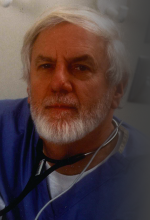You are here
Chair's Message
Author:
Mark Zeidel
Date Written:
June 26, 2018
Published By:
Harvard Medical School's Department of Medicine News
Archived News Story:
As some of you may have heard, our dear friend and colleague Warner Vincent Slack, MD, has died at the age of 85. He was a Professor of Medicine at Harvard Medical School, co-founder of our Division of Clinical Informatics, and a pioneer in the field of medical informatics. For over 50 years Warner paved the way, using computers to improve medical communication and empower both patients and doctors. He was an outstanding educator to thousands of physicians, scientists, engineers, patients/families, and the public.
Warner went to Columbia University for medical school and University of Wisconsin for residency in neurology. During the Vietnam War he was in a M.A.S.H. unit at Clark Air Force Base in the Philippines. He later returned to the University of Wisconsin in Madison in the Departments of Medicine and Computer Science. It was here that he helped develop the first computer-based medical history system in which the computer could engage in an interactive dialog with a patient. In 1966, he published “A computer-based medical history system” in the New England Journal of Medicine, which became a seminal paper in the field of clinical informatics.
In 1970, Dr. Slack was recruited by Dr. Howard Hyatt to come to Harvard and Beth Israel to work with Dr. Howard Bleich. In 1976, Dr. Mitchell Rabkin approached the pair about creating the world’s first integrated hospital computing system. They did, and to this day, it is a model for many commercial systems, like EPIC and Meditech. The Center for Clinical Computing computerized every department of Beth Israel and Brigham and Women's Hospitals. The CCC system served the needs of physicians, nurses, house staff, other hospital personnel as well as patients themselves.
From 1989 through 1998, Warner was Editor-in-Chief of the journal MD Computing and over the years he served on the editorial boards of many other publications. In 2001, he and Dr. Bleich received the Morris F. Collen Award for Excellence from the American College of Medical Informatics. This prestigious award is presented to an individual(s) whose personal commitment and dedication to biomedical informatics has made a lasting impact on healthcare and biomedicine.
Warner also made significant contributions to civil and humanitarian causes. In 1965, he participated in the Selma to Montgomery Freedom March. In 1966, he was co-founder of Faculty and Students for Equality at the University of Wisconsin. He was one of the first members of the Society of Physicians for Social Responsibility and a member of Physicians for Human Rights. In 1995, Princeton recognized him with the Outstanding Contributions to Society Award. In 2017, BIDMC created the Warner Slack Fellowship to support graduate informatics fellows.
Warner was an exceptionally generous and warm human being. He envisioned a new field of medicine assisted by computers with patients at the center. He lived to see his vision come to reality and created a legacy in those he treated, trained, inspired, and loved.




